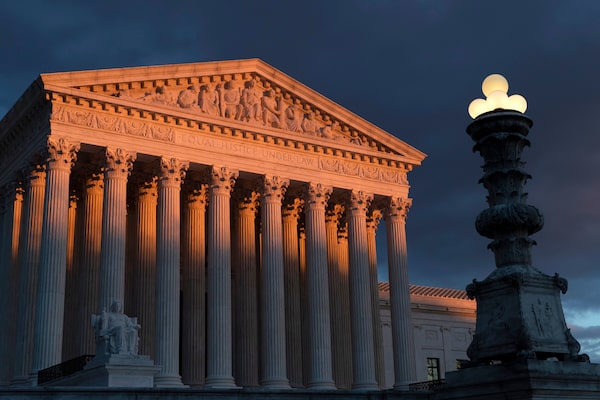
In this Jan. 24, 2019, file photo, the U.S. Supreme Court is seen in Washington.J. Scott Applewhite/The Associated Press
The U.S. Supreme Court on Tuesday barred a lawsuit against a Border Patrol agent for fatally shooting a 15-year-old Mexican boy on Mexican soil from across the border in Texas, refusing to open the door for foreign nationals to pursue civil rights cases in American courts in such incidents.
The court ruled 5-4 to uphold a lower court’s dismissal of the lawsuit against the agent, Jesus Mesa, who was standing on the U.S. side of the border when he shot Sergio Adrian Hernandez Guereca in the face in the 2010 incident. The family sued in federal court seeking monetary damages, accusing Mesa of violating the U.S. Constitution’s Fourth Amendment ban on unjustified deadly force and the Fifth Amendment right to due process.
The court, with the five conservative justices in the majority and the four liberals dissenting, refused to allow people who are not in the United States at the time of a cross-border incident to file civil rights lawsuits in federal court.
Justice Samuel Alito, writing for majority, said the case presented “foreign relations and national security implications” and noted that Congress should decide whether such lawsuits can be permitted, backing the position taken by President Donald Trump’s administration.
Alito added that the United States and Mexico have sought to resolve border issues through diplomacy and that U.S. Border Patrol agents have a key role in protecting national security, including illegal cross-border traffic.
The incident took place on the border between El Paso and Ciudad Juarez in Mexico. Hernandez was in a culvert located right on the border, just on the Mexican side.
In a dissenting opinion on behalf of the court’s liberals, Justice Ruth Bader Ginsburg dismissed the national security concerns cited by the conservative majority.
“Mesa’s allegedly unwarranted deployment of deadly force occurred on United States soil. It scarcely makes sense for a remedy trained on deterring rogue officer conduct to turn upon a happenstance subsequent to the conduct – a bullet landing in one half of a culvert, not the other,” Ginsburg wrote.
Mesa did not face criminal charges, though Mexico condemned the shooting. The family also sued the federal government over the shooting but that was dismissed early in the litigation.
The ruling was issued at a time of high tensions involving the southern border, where Trump is pursuing construction of a wall separating the United States and Mexico.
The dispute hinged on whether the family, despite Hernandez having died on Mexican soil, could seek monetary damages against what they call a “rogue” agent for alleged civil rights violations.
The Supreme Court generally has been reluctant to extend the scope of civil rights protections. For example, it ruled in 2017 that former U.S. officials who served under President George W. Bush could not be sued over the treatment of non-U.S. citizen detainees rounded up in New York after the Sept. 11, 2001 attacks.
The Border Patrol said at the time of the incident that Hernandez was pelting U.S. agents with rocks from the Mexican side of the Rio Grande when he was shot. The FBI also said Hernandez was an immigrant smuggler who had been pressed into service by smuggling gangs, guiding illegal immigrants into the United States.
The lawyers for Hernandez’s family disputed that account, saying he was playing a game with a group of teenagers in which they would run across a culvert from the Mexican side and touch the U.S. border fence before running back.
Our Morning Update and Evening Update newsletters are written by Globe editors, giving you a concise summary of the day’s most important headlines. Sign up today.